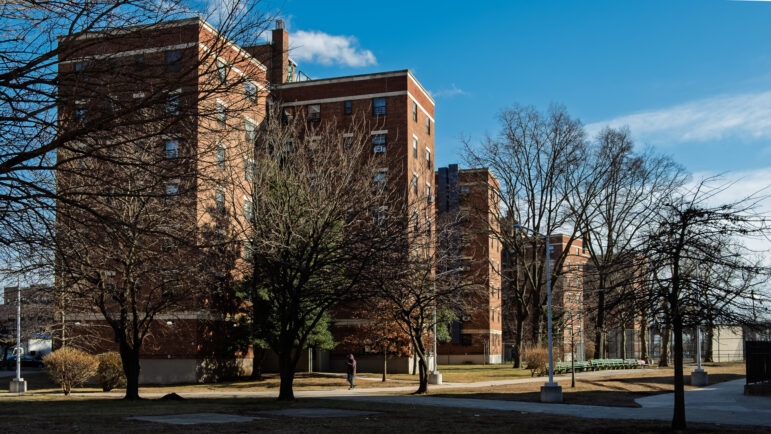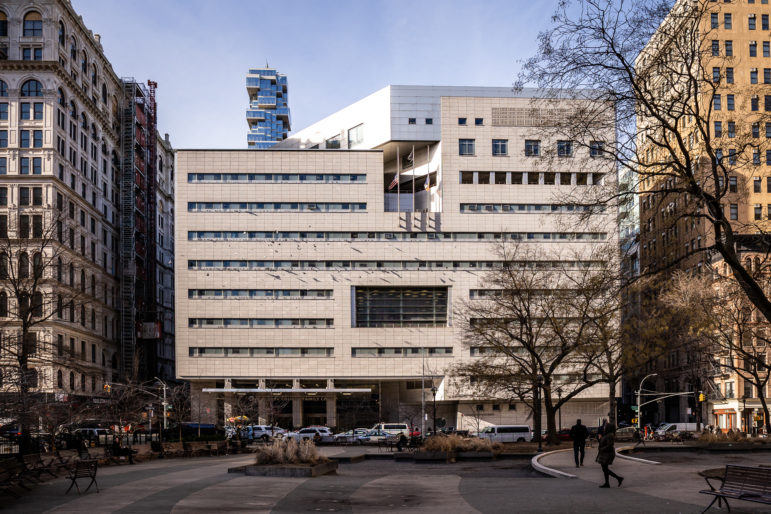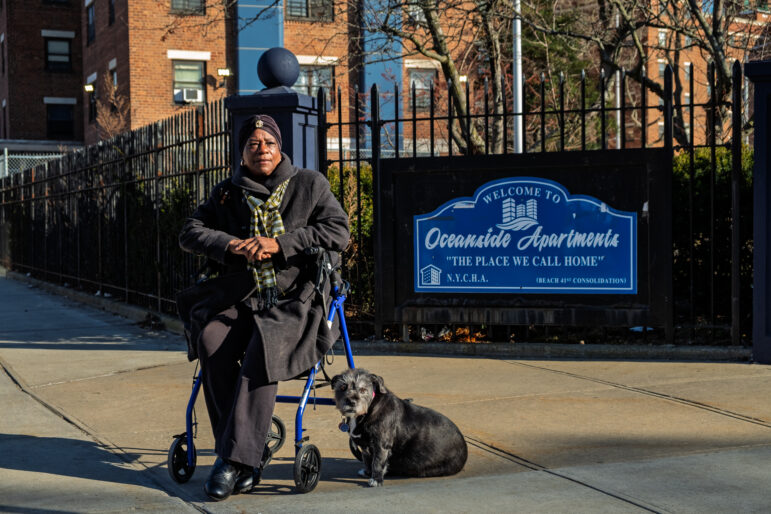Hundreds of tenants and brokers descended on City Hall Wednesday to debate legislation that would stop landlords from passing broker fees on to tenants.
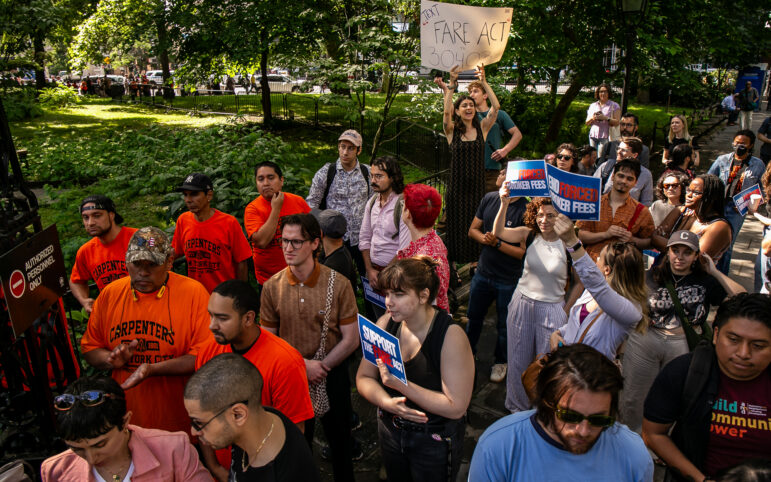
Adi Talwar
Tenants rally in City Hall Park on June 12, for the FARE Act.Friends Vlad Prikhodko and Jessica Johnson came to City Hall Park Wednesday morning after seeing an Instagram post from Brooklyn Councilmember Chi Ossé. They wanted to rally for legislation that would save them from paying rental brokers they do not hire.
Prikhodko, a full-time student and restaurant server from Ridgewood, has moved five times in New York City. He’s no stranger to brokers, who he often encounters after responding to a listing that he finds online.
“There was one big apartment building and I contacted the broker and was like, ‘So, can I come see the apartment?’ And he was like, ‘Yeah the door is open,’” he recalled. “I’m like ‘Oh, you’re not going to be there?’ ‘No.’”
The fee associated with that unit was 12 percent of one year’s rent. Prikhodko decided it wasn’t worth it to even visit. But his current apartment came with a $2,300 broker fee, part of the $7,000 he owed up front—a “big, big, big cost.”
Johnson, for her part, managed to find an apartment last August without a broker fee, which she said she simply wouldn’t have been able to afford as a recent college graduate. But it wasn’t easy: “It was plenty of tears.”
Jody Cross, standing nearby, recalled the “alarming experience” of paying a $2,000 broker fee on a $1,450-per-month apartment eight years ago in Queens. “I needed first [month], security and broker fee to move in, so just to get the key I needed about $5,000 on hand,” she recalled. “The broker pretty much opened the door.”

Adi Talwar
Tenant Vlad Prikhodko came to City Hall Park Wednesday having struggled to pay broker fees in the past.These experiences, common in New York City, may be hard for renters elsewhere in the country to understand. The longstanding local practice—the renter must pay a broker fee even though they did not hire the agent—is relatively unique, according to Max Besbris, as associate professor of sociology at the University of Wisconsin.
“New York is really the only place along with a few other key exceptions, Boston being the major one… but very rarely anywhere else do you see renters having to pay a broker fee to a real estate agent that they did not hire,” he told City Limits this week.
This is in part because New York City’s rental market is notoriously competitive. Last year, the vacancy rate was a miniscule 1.41 percent.
Besbris, who studies sale and rental markets, also cited property ownership consolidation in New York City following the 1970s fiscal crisis and a powerful real estate industry lobby. In this type of environment, practices become institutionalized and consumers lack the leverage to challenge them, he said.
But Ossé, primary sponsor of the Fairness in Apartment Rental Expenses Act, or FARE Act for short, helped give tenants a bullhorn Wednesday, when the Council held a hearing on his proposal. The bill itself is quite short, and would require brokers to collect fees from the party that hires them—whether that be the tenant or the landlord.
The legislation would not put a cap on broker fees, which typically range from one month’s rent to 15 percent of the annual rent. Legislation that would have capped fees at one month’s rent died on the vine in 2019.
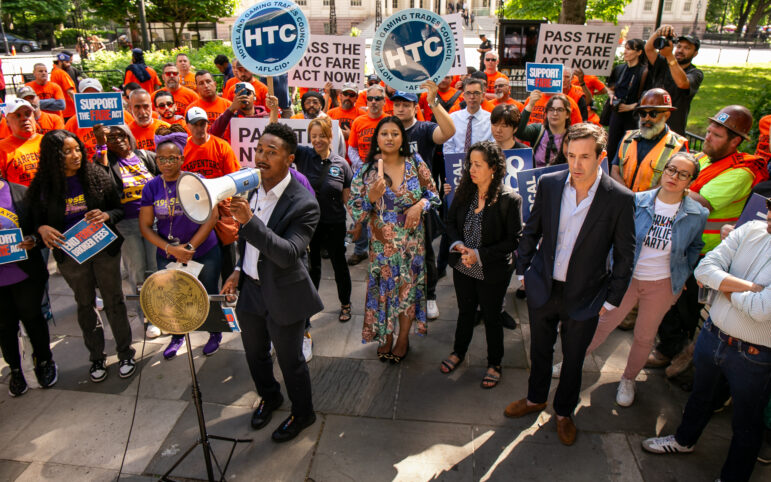
Adi Talwar
Councilmember Chi Ossé addresses FARE Act supporters.Speaking to City Limits on the eve of the hearing, Ossé described his 2023 apartment hunt in Bed-Stuy, which helped clarify his position on broker fees.
“When I was looking for an apartment a year ago it was hard for me to find an apartment in the confined space of my district,” he said. “I even found that when I toured an apartment myself, or even heard of one through a friend, that I’d still have to be forced to pay a fee to a broker that I didn’t hire or didn’t even meet.”
Ossé ended up hiring a broker of his own, and recently renewed his lease. “This person helped me find an apartment that I love living in today,” he said. “But just because I was able to hire a broker doesn’t mean that anyone should be forced to pay for a broker that my landlord hired.”
As it currently stands, not all New York City rentals have associated fees that fall on the tenant. According to the listings platform StreetEasy, about 50 percent of its rentals at any given time are listed as “no-fee.”
However, these apartments tend to be at the higher end of the rental market, according to the company, which is supportive of Ossé’s bill. In 2023, just over 60 percent of the no-fee rentals it listed exceeded the city’s median asking rent of $3,490.
StreetEasy also estimated that renting a New York City apartment with an associated broker fee cost an average of $12,367 up front last year, assuming a 12 percent fee plus first month’s rent, a security deposit and an application fee.
Even so, the Real Estate Board of New York (REBNY), which counts 14,000 brokers in its membership ranks, has mounted a public pressure campaign claiming Ossé’s bill will be bad for tenants. On Wednesday, hundreds of brokers rallied outside of City Hall before packing the Council chambers to condemn it.
“Look, forget brokers, if we’re talking about what’s good for renters—you know, a lot of us, myself included, are also renters—it’s a bad idea,” said Teresa Stephenson, president of Platinum Properties. She predicted that landlords will stop using brokers, who typically prepare public listings, leading to fewer options for tenants.
REBNY, which also represents property owners, sent email blasts to its members ahead of Wednesday providing sample testimony and social media templates. (Ossé, the Council’s resident Gen Z member, is savvy in his own right, enlisting famous friends like Ilana Glazer to encourage turnout.)
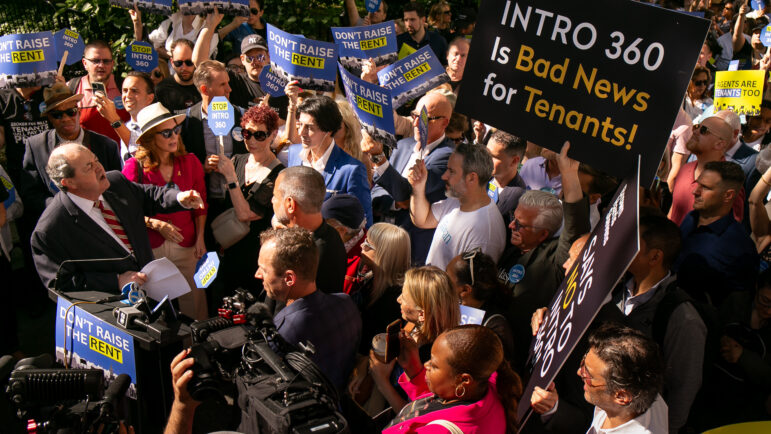
Adi Talwar
Brokers rally near the Broadway entrance to City Hall ahead of the FARE Act hearing.“Cost just doesn’t dissipate into thin air,” said Ryan Monell, REBNY’s vice president of government affairs, in a call before the hearing. Forced to pay broker fees, he said, landlords may simply bake that cost into the rent. Tenants who renew from year to year will see the cost compound with annual rent increases.
Heather Huff, a broker with Bohemia Realty Group, spoke to City Limits between appointments. She recalled a hectic stretch in early 2020, when the Department of State announced that tenants couldn’t be charged broker fees, based on its interpretation of a sweeping 2019 tenant protection law. REBNY sued, and the guidance was quickly blocked and ultimately overturned.
“When that guidance was happening, all of the rents went up that I saw,” said Huff, who estimated her practice is 70 percent rentals.
But Ossé has countered that a large share of city rentals are stabilized—41 percent, according to the 2023 Housing Vacancy Survey. In these cases, landlords can’t increase rents at will. And in free market units, he argues, there are other factors at play: “Rent is set by market forces, not by landlords.”
REBNY predicts that small property owners could be among the first to ditch brokers, unable to afford the cost.
One such owner, Rob Lee, has five buildings in Brooklyn with 19 apartments across them. Lee, who is not a REBNY member, told City Limits that he does not use brokers. “I have open houses because I don’t live far away and I want to be here when showing the apartments,” he explained in a Tuesday call.
But Lee also manages a larger building in Williamsburg, with 21 units. He’s already discussed the FARE Act with that owner, and agreed to show the apartments himself if it passes, without additional charge. The owner’s wife would advertise the apartments.
“The guy doesn’t get many vacancies either, so I’m not really bothered much by it,” Lee said. But he’s still critical of the bill, which he predicted would put hard working brokers out of business.
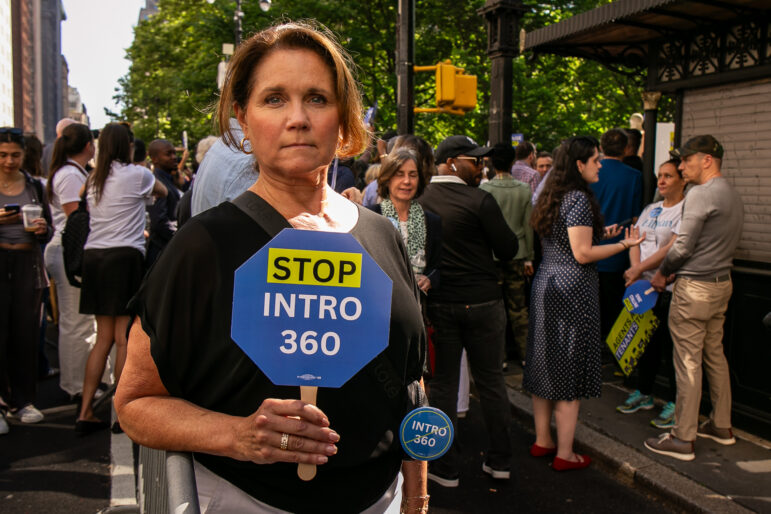
Adi Talwar
Corcoran broker Julia Boland rallies against the FARE Act.Yet not all brokers are critical of the FARE Act, which has over 30 co-sponsors. Anna Klenkar, a broker with Sotheby’s working primarily in sales, advised on the legislation and recently published a point-by-point rebuttal to REBNY’s primary arguments.
Speaking to City Limits last week—and emphasizing that she did not speak for her brokerage—Klenkar said REBNY’s full court press is making her and her peers look like villains, while a more straightforward payment system could help their image.
Landlords who hire brokers don’t have to worry about preparing listings, paying $7-per-day StreetEasy fees, evaluating tenants, running credit checks, or navigating fair housing laws, she said. While a tenant might hire a broker to tap into their knowledge of the market, or simply for the convenience of not having to schedule appointments.
If the FARE Act passes, Klenkar predicted, more tenants will be able to afford to move, and could even save toward buying. “More movement is more business, which is generally better for agents,” she said.
Still, some brokers may take a hit, she said, particularly if they are used to getting a 15 percent commission on all of their listings.
If fees drop, that will be telling, Klenkar testified before the City Council Wednesday: “If our incomes drop because landlords pay us less than they expected tenants to pay, it just shows the current system is built on exploitation.”
To reach the reporter behind this story, contact Emma@citylimits.org. To reach the editor, contact Jeanmarie@citylimits.org
Want to republish this story? Find City Limits’ reprint policy here.




